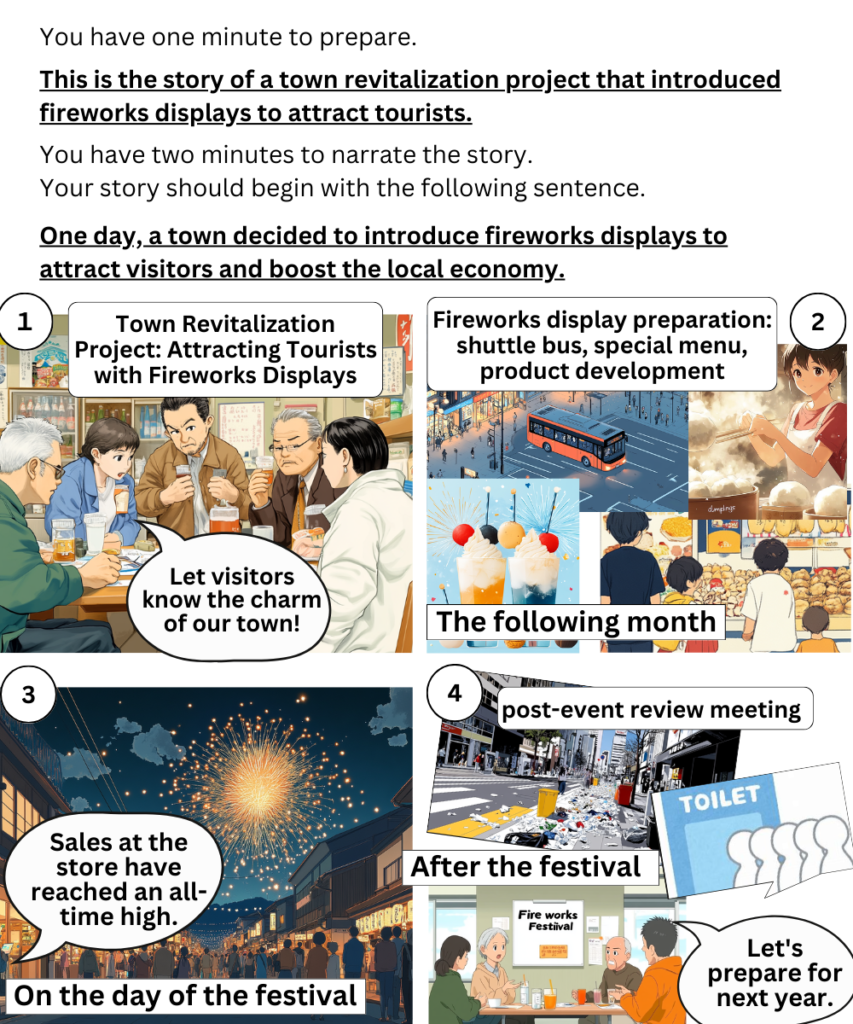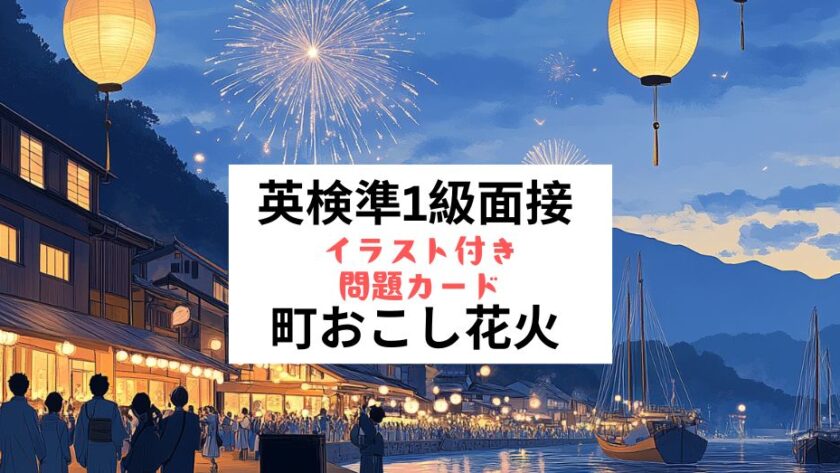実際の出題形式(問題カード)で英検準1級の面接練習を独学できるページです。
2024年度リニューアル対応!
所要時間:概ね8分
目次
- 1 質問概要
- 2 問題カード
- 3 ナレーションと質問
- 4 質問音源チャレンジ
- 5 解答例
- 6 町おこしジョーク
- 6.1 1. Why did the small town organize a comedy festival?To make sure they didn’t become a “ghost town”!
- 6.2 2. What do you call a town that revitalizes by planting trees?A “rooting” community!
- 6.3 3. Why did the mayor start a music festival? To “tune up” the local economy!
- 6.4 4. Why did the small town open a bakery? Because they kneaded some dough for the economy!
- 6.5 5. What’s the town’s favorite way to attract tourists? Making a “scene”!
質問概要
ナレーション内容を考える(1分間)
イラストの内容を説明するナレーションを考える
ナレーション(2分間):ナレーションを始める
※2分以上続く場合は、途中でも中止させられるので注意
Q&A(No. 1):イラスト関連の質問
イラストに関連した質問。「問題カード」を見ながら解答できます。
※登場人物が考えている事などを聞かれます。
Q&A(No.2, No. 3)
問題カードに関連した、受験者の意見を問う質問
Q&A(No. 4)
問題カードのトピックに少し関係のある質問。受験者の意見を問う質問
※この<No. 4>質問文に「導入文」が追加されました。
問題カード

ナレーションと質問
ナレーション指示
<指示>Look at the pictures carefully and read the directions silently for one minute.(1分間)
<指示>Now, please begin your narration.(2分間)
Question No.1
Please look at the third picture. If you were one of the local shop owners, what would you be thinking?
Question No.2
Do you think hosting events like a fireworks festival is an effective way to revitalize a small town?
Question No. 3
What challenges do you think small towns face when organizing large events like this?
Question No.4
There are more and more cases where local companies are participating in local town revitalization plans. Do you think local businesses should be involved in planning community events?
質問音源チャレンジ
本番のように、英語の質問を聞いて答える練習をしてみましょう。
ナレーション準備
ナレーション開始
Question 1 mp3
Question 2 mp3
Question 3 mp3
Question 4 mp3
解答例
ナレーション例
<1> One day, a small town decided to hold a fireworks festival to attract tourists and revitalize the local economy. The event aimed to showcase the town’s charm and increase visitors from outside.
ある日、小さな町が観光客を引き寄せ、地域経済を活性化するために、花火大会を開催することを決定した。このイベントは町の魅力を広め、外部からの訪問者を増やすことを目指していた
町おこしや活性化を表す表現をいくつか押さえておこう。
1. Revitalize: 活性化する、再活性化する
2. Rejuvenate: 活性化する、若返らせる
3. Revive: 再生する、復興する
4. Boost: 押し上げる、促進する
5. Stimulate: 刺激する、促進する
6. Invigorate: 活気づける、元気にする
<2> The following month, local businesses and residents began preparing for the fireworks festival. Special menus and products were created, and shuttle buses from the nearest station to the festival site were arranged. The entire town worked together to welcome the visitors.
翌月、地元の企業や住民が花火大会の準備を始めた。特別なメニューや商品の販売に加え、最寄り駅から祭り会場への送迎バスも手配された。町全体が協力し、訪問者を迎える準備を整えた
<3> On the day of the festival, the town was bustling with tourists, and the night sky was lit up with beautiful fireworks. Local shops and restaurants thrived with the influx of visitors, resulting in a significant increase in sales. The festival energized the town, and both residents and tourists enjoyed the event.
祭りの日、町は観光客で賑わい、夜空には美しい花火が打ち上げられた。地元の店やレストランは大勢の観光客で活気づき、売上も大幅に増加した。祭りは町を活気づけ、住民も観光客もイベントを楽しみました。
Bustling(賑やかな、活気に満ちた) のように「雰囲気」を表す表現を覚えよう!
1. Lively: 活気のある、元気な
2. Vibrant: 活気のある、躍動的な
3. Energetic: 活気のある、エネルギッシュな
4. Busy: 混雑している、賑わっている
5. Quiet: 静かな
6. Calm: 落ち着いた、穏やかな
7. Still: 静止した、動きのない(湖の様子など)
8. Deserted: 人がいない、閑散とした
<4> After the festival, organizers, businesses, and residents gathered to discuss issues for future events. Topics like a shortage of trash cans, public toilets, and noise complaints from residents were raised, with solutions considered. While the festival was a success overall, it was acknowledged that further improvements were necessary for the next event.
祭りの後、主催者、企業、住民が集まり、次回に向けた課題を話し合った。ゴミ箱や公衆トイレの不足、そして住民が感じた騒音被害などが議題に上がり、改善策が検討された。全体的に祭りは成功したものの、次回開催に向けてさらに改善が必要であることが確認された
Question 1 解答例
質問:3枚目のイラストを見てください。もしあなたが地元の店主だったら、何を思うでしょうか?
I would be thinking about how the fireworks festival significantly boosted my sales and brought more attention to my shop. I would also consider how I could prepare better for the next event, perhaps by expanding my product offerings or arranging additional staff to handle the increased customer flow.
花火大会が売り上げを大幅に伸ばし、店に注目を集めたことについて考えるでしょう。また、次のイベントに向けて、商品ラインナップを拡充したり、増えた客に対応するためにスタッフを追加したりすることを考えるかもしれません。
便利な表現がたくさん出てきたね。
1. boosted my sales(売り上げを伸ばした)
2. brought more attention to my shop(店に注目を集めた)
3. prepare better for the next event(次のイベントに向けてより良く準備する)
4. expand my product offerings(商品ラインナップを拡充する)
5. arrange additional staff(スタッフを追加する)
6. handle the increased customer flow(増えた客に対応する)
Question 2 解答例
花火大会のようなイベントを開催することは、小さな町を活性化させるのに効果的な方法だと思いますか?
Yes. Hosting events like a fireworks festival can attract tourists, which boosts local businesses and raises awareness of the town. It also fosters a sense of community as residents work together to make the event successful.
はい。花火大会のようなイベントを開催することで観光客を引き寄せ、地元のビジネスを活性化させ、町の認知度を高めることができます。また、住民が協力してイベントを成功させるため、コミュニティの感覚も育まれます。
No. While events like a fireworks festival can attract tourists temporarily, the impact may not be sustainable. Without continuous efforts to improve the town’s infrastructure and other attractions, the long-term benefits might be limited.
いいえ。花火大会のようなイベントは一時的に観光客を引き寄せることができますが、その影響は持続しないかもしれません。町のインフラや他の観光資源を継続的に改善しない限り、長期的な利益は限定的かもしれません。
Question 3 解答例
このような大規模なイベントを開催する際に、小さな町が直面する課題は何だと思いますか?
Small towns may face challenges such as limited resources for infrastructure, managing large crowds, and addressing residents’ concerns about noise and waste. It can be difficult to balance the needs of tourists with those of the local community.
小さな町では、インフラの限られたリソース、大規模な人混みの管理、騒音やゴミに関する住民の懸念に対処するなどの課題に直面することがあります。観光客のニーズと地域社会のニーズを両立させるのは難しいかもしれません。
Question 4 解答例
地方の町おこし計画には、地元企業が参加するケースが増えています。コミュニティイベントの計画には、地元企業が関与すべきだと思いますか?
Yes. Local businesses should be involved because they can offer valuable insights into what visitors might want, and their participation can lead to better coordination, which benefits both the event and the local economy. Moreover, it fosters a stronger sense of community.
はい。地元のビジネスは、訪問者が何を求めているかについて貴重な洞察を提供できるため、関与すべきです。また、参加することで、イベントと地域経済の両方に利益をもたらすより良い調整が可能になります。さらに、コミュニティの一体感も強まります。
No. Involving local businesses in the planning process might lead to conflicts of interest, with some businesses prioritizing their profits over the overall success of the event. It’s important to have a neutral party manage the planning to ensure fairness and inclusivity.
いいえ。地元企業を計画段階に関与させると、利益相反が生じる可能性があり、一部の企業がイベント全体の成功よりも自分たちの利益を優先するかもしれません。公平性と包括性を確保するために、中立的な立場の人が計画を管理することが重要です
面接練習はask本校にお尋ねください:無料体験レッスン予約
こちらの投稿もおススメです:英検準1級面接問題カード|在宅勤務トピック質問と回答例
町おこしジョーク
1. Why did the small town organize a comedy festival?
To make sure they didn’t become a “ghost town”!
- 日本語訳: なぜ小さな町はコメディフェスティバルを開催したの?
幽霊都市にならないようにするためさ! - 解説: 「ghost town(ゴーストタウン)」は、人が住まなくなった町のことを指します。このジョークは、町おこしのために人々を引き寄せ、町が活気を失わないようにするというユーモラスな表現です。
2. What do you call a town that revitalizes by planting trees?
A “rooting” community!
- 日本語訳: 木を植えて活性化する町を何と呼ぶ?
「根付く」コミュニティさ! - 解説: 「rooting」は「根付く」という意味がありますが、同時に「応援する」という意味もあります。このジョークは、町が木を植えて根付くように発展することを掛けています。
3. Why did the mayor start a music festival?
To “tune up” the local economy!
- 日本語訳: なぜ市長は音楽祭を始めたの?
地元経済を「調律」するためさ! - 解説: 「tune up」は楽器などを調律する意味がありますが、ここでは地元経済を整え、活性化することをユーモラスに表現しています。
4. Why did the small town open a bakery?
Because they kneaded some dough for the economy!
- 日本語訳: なぜ小さな町はパン屋を開いたの?
経済のために「生地(資金)」が必要だったからさ! - 解説: 「knead」はパン生地をこねるという意味ですが、ここでは「dough」が「パン生地」と「お金(スラング)」の二重の意味を持っていることを利用したジョークです。町おこしのために資金が必要だったことを笑いにしています。
5. What’s the town’s favorite way to attract tourists?
Making a “scene”!
日本語訳: 町が観光客を引き寄せるための一番のお気に入りの方法は何?
「シーン」を作ることさ!
解説: 「make a scene」は「騒ぎを起こす」という意味もありますが、ここでは町が観光名所やイベントを作って注目を集めることを意味しています。




